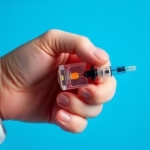Welcome to the world of Minor Meds! Whether you are dealing with a headache, a cold, or a minor injury, these over-the-counter medications can be your best friend in times of need. In this article, we will explore the benefits of Minor Meds, the common types available, how to properly use them, potential side effects, precautions to take, and when it’s time to consult a healthcare professional.
Benefits of Minor Meds
Minor meds, also known as over-the-counter (OTC) medications, are a convenient and accessible way to treat common ailments without needing a prescription from a healthcare provider. These medications can be found in your local pharmacy, grocery store, or online, making them easy to obtain when you need them.
One of the key benefits of minor meds is their ability to provide quick relief for everyday health issues. Whether you have a headache, a cold, allergies, or a minor injury, OTC medications can help alleviate symptoms and improve your overall well-being. Instead of suffering through discomfort, minor meds offer a simple solution to help you feel better fast.
Another advantage of minor meds is their cost-effectiveness. OTC medications are typically more affordable than prescription drugs, making them a budget-friendly option for managing common health issues. By having these medications on hand, you can save time and money by avoiding unnecessary trips to the doctor for minor ailments.
Minor meds are also easy to use, with clear instructions on the packaging to help you take the correct dosage and use them safely. This accessibility and user-friendly nature make OTC medications a popular choice for many people looking for quick and effective relief from minor health concerns.
Additionally, minor meds can be a valuable tool for self-care and empowerment. By being able to treat minor health issues on your own, you can take control of your well-being and make informed decisions about your health. This self-reliance can boost your confidence and help you feel more proactive about managing your health.
Overall, minor meds offer a wide range of benefits, from providing quick relief for common ailments to being cost-effective, easy to use, and empowering for individuals. By having a selection of OTC medications on hand, you can be prepared to address minor health issues as they arise, ensuring that you can feel your best and get back to enjoying life without unnecessary discomfort.
Common Types of Minor Meds
So, you’re feeling under the weather and considering reaching for some over-the-counter medication to help alleviate your symptoms. But with so many options lining the pharmacy shelves, it can be overwhelming to know which one to choose. Let’s break down some common types of minor meds to help you make an informed decision.
- Pain Relievers: These medications, such as acetaminophen (Tylenol) or ibuprofen (Advil), are commonly used to relieve mild to moderate pain, such as headaches, muscle aches, and menstrual cramps. They can also help reduce fever.
- Antihistamines: If you’re dealing with allergies, hay fever, or symptoms like sneezing and itching, antihistamines like loratadine (Claritin) or diphenhydramine (Benadryl) can provide relief by blocking histamine, a substance that causes allergic reactions.
- Decongestants: When you’re battling a stuffy nose or sinus congestion, decongestants like pseudoephedrine (Sudafed) or phenylephrine can help shrink swollen blood vessels in the nasal passages, making it easier to breathe.
- Cough Suppressants: For a nagging cough, cough suppressants such as dextromethorphan (Robitussin) can help calm the cough reflex, providing temporary relief from coughing.
- Antacids: If you’re experiencing heartburn, indigestion, or acid reflux, antacids like Tums or Rolaids can neutralize stomach acid, providing quick relief from discomfort.
- Anti-diarrheal Medications: When you’re dealing with diarrhea, medications like loperamide (Imodium) can help slow down the movement of the intestines and reduce bowel movements.
It’s important to always read the label and follow the recommended dosage instructions for any minor med you decide to take. If you have any questions or concerns about which medication is right for you, don’t hesitate to consult with a pharmacist or healthcare professional for guidance.
How to Properly Use Minor Meds
So, you’ve got your hands on some minor meds to help alleviate those pesky symptoms. But before you start popping pills like they’re candy, it’s important to know how to properly use them for maximum effectiveness and safety.
1. Read the Label: This may seem like a no-brainer, but always start by reading the label on the medication packaging. Pay close attention to the dosage instructions, frequency of use, and any warnings or precautions.
2. Follow Dosage Instructions: It can be tempting to take more medication than recommended to get quick relief, but this can be dangerous. Stick to the recommended dosage and do not exceed the maximum daily limit unless advised by a healthcare professional.
3. Take with Food: Some minor meds may cause stomach upset if taken on an empty stomach. To avoid this, take your medication with a light snack or meal unless otherwise directed.
4. Avoid Mixing Medications: Be cautious when taking multiple minor meds at the same time. Some medications may interact with each other, leading to harmful side effects. Consult with a healthcare professional before combining medications.
5. Stay Hydrated: It’s important to drink plenty of water when taking minor meds to help your body process the medication effectively. Dehydration can impact the absorption and efficacy of the medication.
6. Don’t Crush or Chew: Unless specifically instructed to do so, do not crush or chew tablets or capsules. This can alter the way the medication is released in your body and may lead to unintended side effects.
7. Set a Schedule: To ensure you don’t miss a dose, try to take your medication at the same time each day. You can set a reminder on your phone or create a daily routine to help you remember.
8. Finish the Course: Even if you start feeling better before you finish the medication, it’s crucial to complete the entire course as prescribed. Stopping prematurely can lead to a recurrence of symptoms or antibiotic resistance.
9. Store Properly: Keep your minor meds in a cool, dry place away from direct sunlight and out of reach of children and pets. Check the expiration date before taking any medication to ensure its effectiveness.
Remember, when in doubt, always consult a healthcare professional for guidance on how to properly use minor meds. Your health is important, so take care of yourself and take your medications responsibly.
Side Effects of Minor Meds
While minor medications can be incredibly helpful in treating common ailments, it’s important to be aware of potential side effects that may arise. Here are some common side effects to look out for:
- Upset Stomach: Some minor medications, like ibuprofen or acetaminophen, can cause stomach discomfort or indigestion. Taking these medications with food or a glass of water can help alleviate this side effect.
- Drowsiness: Certain over-the-counter antihistamines or cold medications may cause drowsiness. It’s important to avoid driving or operating heavy machinery while under the influence of these medications.
- Allergic Reactions: Some individuals may experience allergic reactions to certain medications, leading to symptoms like rash, itching, or swelling. If you notice these symptoms, stop taking the medication and seek medical attention immediately.
- Dizziness: Some minor medications, especially those used to treat allergies or motion sickness, can cause dizziness. It’s important to be cautious when standing up or moving around to avoid falls or injuries.
- Dry Mouth: Medications like decongestants or antihistamines can cause dry mouth, which can be uncomfortable. Drinking plenty of water and using sugar-free lozenges can help alleviate this side effect.
- Constipation: Certain pain relievers or antacids can cause constipation as a side effect. Increasing your fluid intake, eating high-fiber foods, and staying active can help prevent or alleviate constipation.
It’s important to note that not everyone will experience these side effects, and some individuals may have different reactions to minor medications. If you do experience any unusual or severe side effects after taking a medication, it’s crucial to stop taking it immediately and consult a healthcare professional for further guidance.
Remember to always read the label and instructions provided with the medication before taking it, and never exceed the recommended dosage. If you have any underlying health conditions or are taking other medications, it’s best to consult with a healthcare professional or pharmacist before starting a new medication to avoid potential interactions or complications.
By being aware of potential side effects and taking the necessary precautions, you can safely and effectively use minor medications to manage common health issues. If you have any concerns or questions about a specific medication, don’t hesitate to reach out to a healthcare professional for guidance and support.
precautions you should keep in mind
Now, let’s talk about some precautions you should keep in mind when taking minor medications. It’s important to remember that even though these meds may be readily available over the counter, they still have potential risks and side effects if not used correctly. Here are some tips to help you stay safe and get the most out of your medication:
1. **Read the Label:** Always read the label carefully before taking any medication. Pay attention to the dosage instructions, possible side effects, and any warnings or precautions. If you have any questions or concerns, don’t hesitate to ask a pharmacist or healthcare professional for clarification.
2. **Follow Dosage Instructions:** It’s crucial to follow the recommended dosage instructions provided on the packaging or by your healthcare provider. Taking more than the recommended amount can lead to serious health issues and may not provide any additional benefits.
3. **Avoid Mixing Medications:** Be cautious when taking multiple medications at the same time. Some medications can interact with each other in harmful ways, leading to adverse effects or reducing the effectiveness of the treatment. If you are unsure about combining medications, consult with a healthcare professional.
4. **Be Mindful of Allergies:** If you have known allergies to certain medications or ingredients, make sure to check the label before taking any new medication. Even minor meds can contain allergens that may trigger a reaction. If you experience any signs of an allergic reaction, such as difficulty breathing or swelling, seek medical attention immediately.
5. **Keep Track of Expiry Dates:** Check the expiration date on your medication and discard any expired or unused meds. Using expired medications can be ineffective or even dangerous, as they may have degraded in potency or developed harmful substances over time.
6. **Store Medications Properly:** Keep your medications in a cool, dry place away from direct sunlight and moisture. Store them out of reach of children and pets to prevent accidental ingestion. Proper storage helps maintain the effectiveness and safety of the medication.
7. **Monitor Side Effects:** Pay attention to any side effects you may experience while taking a medication. Common side effects include dizziness, nausea, or stomach upset. If you notice any unusual or severe side effects, stop taking the medication and consult a healthcare professional.
8. **Inform Your Healthcare Provider:** It’s essential to keep your healthcare provider informed about any medications you are taking, including minor meds. They can provide guidance on potential drug interactions, adjust your treatment plan if needed, or recommend alternative options to ensure your safety and well-being.
By following these precautions and staying informed about your minor medications, you can help minimize risks and maximize the benefits of your treatment. Remember, your health is precious, and it’s essential to take care of it responsibly. If you have any concerns or questions about your medications, don’t hesitate to reach out to a healthcare professional for guidance. Stay safe and be well!
When to Consult a Healthcare Professional
While minor meds can be a convenient and effective way to deal with common health issues, there are times when it’s important to seek advice from a healthcare professional. Here are some instances where consulting a doctor or pharmacist is recommended:
- Severe Symptoms: If you are experiencing severe or persistent symptoms despite taking minor meds, it’s crucial to seek medical attention. This could indicate a more serious underlying condition that requires professional evaluation and treatment.
- Multiple Medications: If you are taking multiple medications, whether they are prescription or over-the-counter, it’s important to consult a healthcare professional before adding a new minor med to your regimen. This is to avoid potential drug interactions that could be harmful to your health.
- Chronic Health Conditions: If you have any chronic health conditions such as diabetes, high blood pressure, or heart disease, it’s advisable to consult with a healthcare provider before taking minor meds. Certain medications may interact with your existing treatment plan or worsen your condition.
- Pregnancy or Breastfeeding: If you are pregnant, breastfeeding, or planning to become pregnant, it’s essential to consult with a healthcare professional before taking any minor meds. Some medications may pose risks to you or your baby, so it’s crucial to get personalized advice from a healthcare provider.
- Allergic Reactions: If you experience any allergic reactions such as rash, itching, swelling, or difficulty breathing after taking a minor med, stop using it immediately and seek medical help. Allergic reactions can be serious and require prompt attention from a healthcare professional.
- Children and Elderly: Special caution should be exercised when giving minor meds to children or elderly individuals. Dosages may need to be adjusted, and certain medications may not be suitable for these age groups. Consulting a healthcare professional can help ensure safe and effective use of minor meds.
Remember, your health and well-being are top priorities, so never hesitate to reach out to a healthcare professional if you have any concerns or questions about using minor meds. They are trained to provide you with expert advice and guidance tailored to your individual health needs.
By taking these precautions and knowing when to seek professional help, you can make the most of minor meds while ensuring your safety and well-being. Your health is important, so don’t hesitate to reach out for help when needed!
Further Reading







